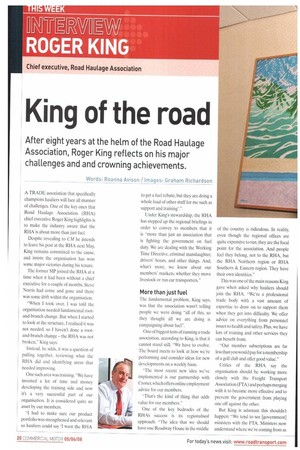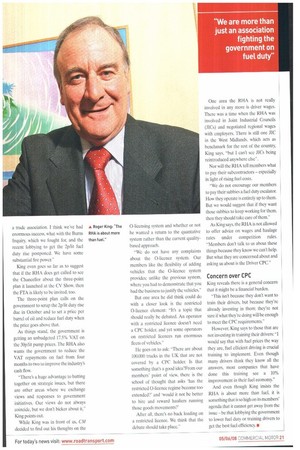King of the road
Page 20

Page 21

If you've noticed an error in this article please click here to report it so we can fix it.
After eight years at the helm of the Road Haulage Association, Roger King reflects on his major challenges and and crowning achievements.
Words: Roanna Avison / Images: Graham Richardson A TRADE association that specifically champions hauliers will face all manner of challenges. One of the key ones that Road Haulage Association (RHA) chief executive Roger King highlights is to make the industry aware that the RHA is about more than just fuel.
Despite revealing to CM he intends to leave his post at the RHA next May. King remains committed to the cause, and insists the organisation has won some major victories during his tenure.
The former MP joined the RHA at a time when it had been without a chief executive for a couple of months. Steve Norris had come and gone and there was some drift within the organisation.
"When I took over, I was told the organisation needed fundamental rootand-branch change. But when I started to look at the structure, I realised it was not needed, so I haven't done a rootand-branch change — the RHA was not broken," King says.
Instead, he adds, it was a question of pulling together, reviewing what the RHA did and identifying areas that needed improving.
One such area was training. "We have invested a lot of time and money developing the training side and now it's a very successful part of our organisation. It is considered quite an asset by our members.
"I had to make sure our product portfolio was strengthened and relevant so hauliers could say 'I want the RHA to get a fuel rebate, but they are doing a whole load of other stuff for me such as support and training'."
Under King's stewardship, the RHA has stepped up the regional briefings in order to convey to members that it is "more than just an association that is fighting the government on fuel duty We are dealing with the Working Time Directive, criminal manslaughter, drivers' hours, and other things. And, what's more, we know about our members' markets, whether they move livestock or run car transporters."
More than just fuel lite fundamental problem. King says, was that the association wasn't telling people we were doing "all of this, so they thought all we are doing is campaigning about fuel".
One of biggest tests of running a trade association, according to King, is that it cannot stand still. -We have to evolve. The board meets to look at how we're performing and consider ideas for new developments on a weekly basis.
"The most recent new idea we've implemented is our partnership with Croner, which offers online employment advice for our members.
"That's the kind of thing that adds value for our members."
One of the key bedrocks of the RHA's success is its regionalised approach. "The idea that we should have one Roadway House in the middle of the country is ridiculous. In reality, even though the regional offices are quite expensive to run, they are the focal point for the association. And people feel they belong, not to the RHA, but the RHA Northern region or RHA Southern & Eastern region. They have their own identities."
This was one of the main reasons King gave when asked why hauliers should join the RHA. "We're a professional trade body with a vast amount of expertise to draw on to support them when they get into difficulty We offer advice on everything from personnel issues to health and safety. Plus, we have lots of training and other services they can benefit from.
"Our member subscriptions are far less than you would pay for a membership of a golf club and offer good value."
Critics of the RHA say the organisation should be working more closely with the Freight Transport Association (ETA) and perhaps merging with it to become more effective and to prevent the government from playing one off against the other.
But King is adamant this shouldn't happen: "We tend to see [government] ministers with the ETA. Ministers now understand where we're coming from as a trade association. I think we've had enormous success, what with the Burns Inquiry, which we fought for, and the recent lobbying to get the 2p/lit fuel duty rise postponed. We have some substantial fire power.
King even goes so far as to suggest that if the RHA does get called to see the Chancellor about the three-point plan it launched at the CV Show, then the FTA is likely to be invited, too.
The three-point plan calls on the government to scrap the 2p/lit duty rise due in October and to set a price per barrel of oil and reduce fuel duty when the price goes above that.
As things stand, the government is getting an unbudgeted 17.5% VAT on the 30p/lit pump prices. The RHA also wants the government to reduce the VAT repayments on fuel from four months to two to improve the industry's cash flow.
"There's a huge advantage to batting together on strategic issues, but there are other areas where we exchange views and responses to government initiatives. Our views do not always coincide, but we don't bicker about it," King points out.
While King was in front of us, CM decided to find out his thoughts on the 0-licensing system and whether or not he wanted a return to the quantative system rather than the current qualitybased approach.
"We do not have any complaints about the 0-licence system. Our members like the flexibility of adding vehicles that the 0-licence system provides; unlike the previous system, where you had to demonstrate that you had the business to justify the vehicles."
But one area he did think could do with a closer look is the restricted 0-licence element: "It's a topic that should really be debated. An operator with a restricted licence doesn't need a CPC holder, and yet some operators on restricted licences run enormous fleets of vehicles."
He goes on to ask: "There are about 100,000 trucks in the UK that are not covered by a CPC holder. Is that something that's a good idea?From our members' point of view, there is the school of thought that asks 'has the restricted 0-licence regime become too extended?' and 'would it not be better to hire and reward hauliers running those goods movements?'
After all, there's no back loading on a restricted licence. We think that the debate should take place." One area the RHA is not really involved in any more is driver wages. There was a time when the RHA was involved in Joint Industrial Councils (JICs) and negotiated regional wages with employers. There is still one JIC in the West Midlands, which acts as benchmark for the rest of the country, King says, "but I can't see JICs being reintroduced anywhere else".
Nor will the RHA tell members what to pay their subcontractors especially in light of rising fuel costs.
"We do not encourage our members to pay their subbies a fuel duty escalator. How they operate is entirely up to them. But we would suggest that if they want those subbies to keep working for them, then they should take care of them."
As King says, the RHA is not allowed to offer advice on wages and haulage rates under competition rules. "Members don't talk to us about these things because they know we can't help. But what they are concerned about and asking us about is the Driver CPC."
Concern over CPC
King reveals there is a general concern that it might be a financial burden.
"This isn't because they don't want to train their drivers, but because they're already investing in them; they're not sure if what they're doing will be enough to meet the CPC requirements."
However, King says to those that are not investing in training their drivers: "I would say that with fuel prices the way they are, fuel efficient driving is crucial training to implement. Even though many drivers think they know all the answers, most companies that have done this training see a 10% improvement in their fuel economy."
And even though King insists the RHA is about more than fuel, it is something that is so high on its members' agenda that it cannot get away from the issue-be that lobbying the government to lower fuel duty or training drivers to get the best fuel efficiency. •








































































































































































